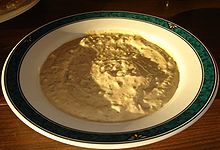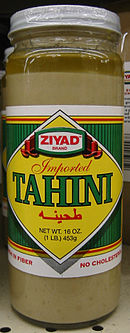Tahini
Tahina [tˤɒˈħiːna] (Arabic طحينة, DMG ṭaḥīna), also tahini or tahini is a paste made from finely ground sesame seeds. It originated in Arabic cuisine and is a basic ingredient of hummus (chickpea puree). It is also served as a side dish or dip, mixed with lemon juice and garlic and often seasoned with spiced sumac.
A distinction is made between tahina made from hulled and unhulled sesame seeds. Tahina made from unhulled sesame seeds is darker, but contains more vitamins, nutrients and, at around 10 grams per 100 grams, more fibre. Tahina is often made from a mixture of both sesame seeds. Tahina made exclusively from hulled sesame seeds is called white tahina.
Tahina is very rich in vitamins (especially B1, B2 and B6), contains a lot of magnesium, potassium, iron, copper, zinc and phosphorus and some calcium. It is also rich in proteins (around 20%) and unsaturated fatty acids (both omega-3 and omega-6). It is therefore popular with vegetarians and vegans and is often offered as an alternative to spreads such as peanut butter in health food stores, but also in Turkish or Arab grocery stores.
In the Orient, Baba Ghanoush is also common, a dip made from grilled, pureed eggplant and tahina. Tahina can also be used in the preparation of halva.
In Chinese cuisine, a sesame paste is called zhimajiang (Chinese 芝麻醬 / 芝麻醤, pinyin Zhīmajiàng). In Japanese cuisine, nerigoma (Japanese 練り胡麻/練りごま / 練りゴマ, "sesame paste") is often used in dishes together with soy sauce. In Germany, such mixtures are sold under the name Goma (Japanese "sesame").

Spiced tahina paste

Tahini in a jar
Search within the encyclopedia